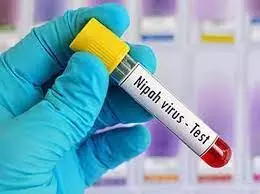
Oxford scientists said that they are assessing whether the technology behind their COVID-19 jab could be used to protect people from the deadly Nipah virus.
If clinical trials are successful, it would be the first ever vaccine for the disease.
Over the last week, people have begun receiving the jab at the University of Oxford as part of the first human trial of the new vaccine.
COVID vaccine developer, Prof. Dame Sarah Gilbert, said that work on the Nipah vaccine started in 2017 and was paused during the COVID-19 crisis.
The scientists noted that the outbreaks of the Nipah virus had mostly been found in South Asia and the virus can be fatal in up to 75 per cent of cases.
Nipah virus can be transmitted to humans from animals, such as bats or pigs, or contaminated foods and can also be transmitted directly from human-to-human.
In humans it can cause acute respiratory infection and fatal encephalitis (swelling of the brain).
The virus was first identified 25 years ago but there were currently no treatments or vaccines available to help when outbreaks emerge.
But the new vaccine, ChAdOx1 NipahB, could be the first if it reaches safety and efficacy expectations.
Some 51 people aged 18 to 55 would participate in the trial, which is being led by the Oxford Vaccine Group and is being funded by the Coalition for Epidemic Preparedness Innovations (CEPI).
The jab was developed using the same “viral vector” vaccine technology found in the University of Oxford and AstraZeneca’s COVID-19 vaccine.
The project would run for 18 months, with further trials expected to follow in a Nipah-affected country.
Dame Sarah, principal investigator at the University of Oxford’s Pandemic Sciences Institute, said:.
“The University of Oxford’s work on the Nipah virus vaccine started in 2017, but was paused during the COVID-19 pandemic.
“Our work developing the COVID-19 vaccine will now help us prepare this Nipah vaccine for licensure, ensuring we’re ready to prevent future outbreaks of this devastating disease from spreading.’’
Professor Brian Angus, the trial’s principal investigator and professor in infectious diseases at the University of Oxford, said:
“Nipah virus was first identified in 1998, and yet 25 years on the global health community still has no approved vaccines or treatments for this devastating disease.
“Due to the high mortality rate and the nature of Nipah virus transmission, the disease is identified as a priority pandemic pathogen.
“This vaccine trial is an important milestone in identifying a solution that could prevent local outbreaks occurring, while also helping the world prepare for a future global pandemic.’’
Dr In-Kyu Yoon, acting executive director of vaccine research and development at CEPI, added:
“Nipah has epidemic potential, with its fruit bat hosts found in areas home to over 2 billion people.
“This trial is a step forward in efforts to build a suite of tools to protect against this killer virus.
“Knowledge gained could also inform development of other Paramyxovirus countermeasures.’’



